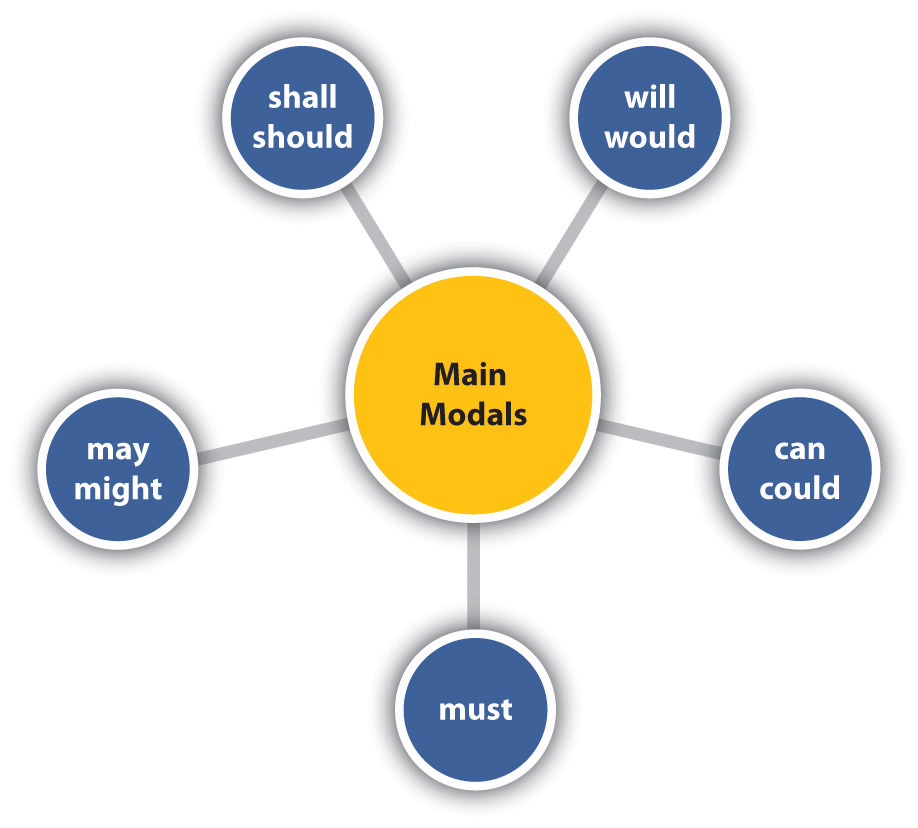
MODALS
Will,would,shall,should,may,might,can,could,must,ought,need ,dare and used to are called Modal Auxiliaries or Modals.
They express the mode or manner of the action denoted by the verb.They express such ideas as ability or capability,probability or possibility,permission,command,duty,obligation,propriety etc.To
USES OF MODALS:
Will is used:
1.. To express pure future with second and third person(you,he,she,it,they):
- You will die of hunger
- The chief Minster will lay the foundation stone.
2. To express willingness,intention,promise,determination with first person (I,we).
- I will write to you again. (promise)
- I will help you. (willingness/intention)
- I will fight to the finish. (determination)
3. To express a characteristic habit,assumption,invitation or request and insistence.
- A dog will usually obey his master.(characteristic habit)
- He will be there by now.(assumption)
- Will you come with me?(request)
- She will not listen to the doctor's advice.(insistence)
Note- will is never used with first person in the Interrogative.
Would is used:
1. To express a habit.
- He would rise early in the morning and go for a walk.
2. To express a polite request.
- Would you open the door,please?
- Would you mind sitting here?
3. To express wish ,preference.
- I wish you would come with us.
- I would like to come with you.
4. To express an imaginary condition.
- I would buy a bike if I won a lottery.
Shall is used:
1. To express pure future with first person(I,we).
- We shall learn this lesson tomorrow.
- I shall help you.
2. To ask for advice,suggestion,request etc.with the first person(I,we) in the Interrogative;
- Shall I open the window?(advice)
- Shall we meet tomorrow?(suggestion)
- Shall I bring a cup of tea for you?(request)
3. To express command, threat,warning,promise,determination ,etc,with the second and third persons(you,he,she,they,etc.)
- You shall do it.
- They shall defend their honour.
- He shall be punished if he repeats his mistake.
Should (past form of shall) is used:
1. To express duty/obligation or advisability or desirability:
- We should obey our parents.(duty)
- You should not be late.(obligation/desirability)
- You should go for a walk.(advisability)
May is used:
1. To express possibility;
- Ravi may come today.
- It may rain today.
2. To express permission:
- you may go now.
- May I come in,Sir ?
3. To express wish,faith or hope:
- May you succeed!
- May God bless you!
4. To express a purpose:
- He is working hard so that he may win a scholarship.
Might (past form of may) is used:
1. To express less possibility:
- He might come today.
- It might rain tonight.
2. To express permission:
- Might I start the discussion?
3. To express Guess:
- That might be the postman.
Can is used:
1. To express permission
- You can borrow my car.
- He can stay here as long as his wishes.
- Can I smoke here ?
2. To express possibility.
- This can be true.
- Any one can make mistakes.
3. To express ability or capability:
- I can lift this box.
- He can keep awake the whole night.
Could (past form of can) is used:
1. To express ability/capacity in the past:
- He could swim very well in his youth.
- I could give him an answer if he had asked me.
2. To express a polite request:
- Could I borrow your book?
- Could you wait for some time?
3.To express possibility under certain conditions:
- If we had money,we could buy a car.
- It could not be true.
Must is used:
1. To express obligation or duty:
- Soldiers must obey the orders of their officers.
- We must not tell lies.
2. To express necessity or compulsion:
- I must go now.
- The letter must be written today.
- He must obey my orders.
- We must not leave before we finish the work
3. To express emphatic advice or determination:
- You must see a doctor at once.
- We must not leave before we finish the work.
4. To express assumption,conclusion/inference,certainty/strong probability:
- The Headmaster must be in his office at this time.
- He must be thirty five.
- He must have reached by now.
'Must' is not used in the Negative or Interrogative in this sense.Instead,can is used.
- The Headmaster cannot be in his office at this time.
- Can he be thirty five?
Article Image is taken by google.

Nice Explanation with good example.
ReplyDelete